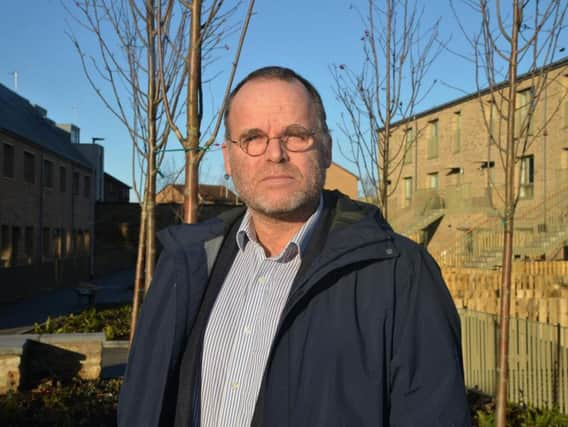Row over devolution of business rates to councils


The Scottish Greens today accused the government of “scaremongering” over its proposals to reverse the "Thatcher-era" centralisation of non-domestic rates, with the SNP claiming the plan would see small businesses face a rates hike of more than £7000.
The row comes as MSPs prepare to vote on the Non-Domestic Rates (Scotland) Bill in Holyrood tomorrow. An amendment to the legislation by the Scottish Greens would mean that the Uniform Business Rate, used to calculate non-domestic property tax, would no longer be set nationally. However, as a result, rates reliefs, including the Small Business Bonus, could end.
Advertisement
Hide AdAdvertisement
Hide AdToday Scottish Green MSP Andy Wightman said: “My proposal would be the biggest devolution of fiscal powers to local authorities since the Scottish Parliament was established, giving councils real power to design a tax regime based on local circumstances and the particular needs of the businesses and communities there.
“However, this is not a radical proposition. It would make Scotland align with most normal European countries, where decisions are taken at a local level as a matter of course. The suggestion that these proposals would punish small businesses is nothing short of scaremongering by the SNP, who bizarrely want to maintain a centralised system introduced in the late 80s by Margaret Thatcher."
He added: “Decisions being made locally would in fact empower small businesses to be able to make their own case to councillors directly. It’s time for the Scottish Government to give power back to local communities, instead of hoarding it all at Holyrood.”
The SNP however said if opposition parties voted for Mr Wightman's amendment to the Bill some small businesses would face a rates hike of more than £7000. The party said new figures had revealed that 120,420 small businesses in Scotland saved £1.79 billion through the Small Business Bonus Scheme since 2007-08, with estimated savings for 2019/20 adding up to a further £272 million.
“Ahead of a crucial vote at Holyrood tomorrow, this is the last chance for the Tories and Labour to listen to the concerns of industry and urgently back track on their support for these proposals.
“The last thing businesses in Scotland need is more chaos and uncertainty, when they’re already exposed to the risk of economic shock that Brexit could cause. The Scottish Government offers the most generous package of business rates reliefs anywhere in the UK, worth billions to business across the country. It is now clear beyond doubt that the SNP is the only party standing up for Scotland’s businesses.”
The SNP also highlighted CoSLA's objection to Mr Wightman's amendment, and a letter signed by 27 Scottish business organisations which also raised concerns.
The council organisation said that while it supported the devolution of rates in principle, it did not believe the measures should be pushed through in the one year timescale proposed. In a briefing sent to MSPs, CoSLA states: "We must emphasise that before any move is taken to devolve Non-Domestic Rates, preparatory work must be undertaken to understand the full implications of such a move and importantly how it fits with the wide funding system for local government."
Advertisement
Hide AdAdvertisement
Hide AdDirector of the Scottish Retail Consortium, David Lonsdale also said the devolution plan was “startling and frankly utterly bewildering.” “This is a significant intervention from CoSLA and whilst we and CoSLA have completely differing views over retention of the Uniform Business Rate, we clearly share a profound unease that a tax change of this magnitude is being progressed in this way.
"The discussion and vote to end UBR at the committee stage of the Bill had negligible consideration for the implications or for those affected, in stark contrast to the rigour and approach pursued through the Barclay Rates Review and subsequent Non-Domestic Rates Bill itself.
"It is startling and frankly utterly bewildering that we are on the cusp of MSPs voting for such a significant tax change without a proper consultation, economic analysis, or a Business and Regulatory Impact Assessment. It’s a huge deficiency and raises serious doubts about the wisdom of making taxation changes of this magnitude in this way.”
Mr Fraser, Tory finance spokesman, said: "We know that local economies suffer when schools close. I can think of five independent schools which have closed in the last two decades – schools like Rannoch, Croftinloan and Butterstone – all of which not only provided education but were also important parts of local economies.
“There is a real risk that taking £7 million a year in additional taxation out of this sector will have a wider knock-on effect on a local economy like Perth and Kinross. A town like Crieff, in which there are a number of independent schools in the local area, will see shops, hospitality businesses, and tradespeople, whose livelihood depends on the existence of independent schools, would suffer.
“The same would apply to a town like Dollar, where the major local employer is Dollar Academy. So, taxing these schools more will have a negative economic impact. That is not to suggest that a school like Dollar Academy is necessarily going to close because of this Bill. However, there will be smaller independent schools which will be put in a much more difficult
situation, among them specialist schools, including Christian schools.”
He added: “Another important point is that there is no independent objective justification for taking this particular measure. The Office of the Scottish Charity Regulator have made clear their opposition to treating independent schools differently from other charities for tax purposes.
“And we have yet to hear a single good argument put forward by the Scottish Government as to why this tax change is necessary or appropriate at this time.”